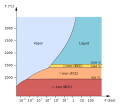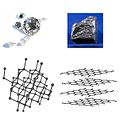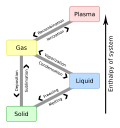carbon allotropes. The melting point of iron is experimentally well defined for pressures less than 50 GPa. For greater pressures, published data (as of 2007)...
15 KB (1,746 words) - 00:31, 9 October 2024
Austenite (redirect from Gamma iron)
Austenite, also known as gamma-phase iron (γ-Fe), is a metallic, non-magnetic allotrope of iron or a solid solution of iron with an alloying element. In plain-carbon...
15 KB (1,789 words) - 01:13, 19 October 2024
Steel (redirect from History of steelmaking)
interaction of the allotropes of iron with the alloying elements, primarily carbon, gives steel and cast iron their range of unique properties. In pure iron, the...
64 KB (7,067 words) - 02:57, 17 November 2024
Ferrite may refer to: Ferrite (iron), one of the allotropes of iron that is stable at room temperature and pressure, α-Fe Ferrite (magnet), a ferromagnetic...
669 bytes (121 words) - 21:13, 16 January 2023
500 hypothetical 3‑periodic allotropes of carbon are known at the present time, according to the Samara Carbon Allotrope Database (SACADA). Under certain...
48 KB (5,635 words) - 04:40, 31 October 2024
Allotropy (redirect from Allotropes of nonmetals)
californium have three allotropes each. In 2017, the concept of nanoallotropy was proposed. Nanoallotropes, or allotropes of nanomaterials, are nanoporous...
31 KB (2,058 words) - 18:24, 29 October 2024
and oxidation and reduction in plants and animals. At least four allotropes of iron (differing atom arrangements in the solid) are known, conventionally...
150 KB (17,078 words) - 12:22, 24 August 2024
metallurgy, non-ferrous metals are metals or alloys that do not contain iron (allotropes of iron, ferrite, and so on) in appreciable amounts. Generally more costly...
8 KB (807 words) - 05:14, 24 August 2024
Alloy (redirect from Alloy of metal)
cooled slowly, the carbon can diffuse out of the iron and it will gradually revert to its low temperature allotrope. During slow cooling, the carbon atoms...
39 KB (5,311 words) - 23:51, 2 November 2024
a variety of allotropes, even at ambient pressure. These allotropes differ widely in crystal structure and density; the α and δ allotropes differ in density...
6 KB (564 words) - 17:17, 3 November 2024
interaction of the allotropes of iron with the alloying elements that gives iron-hydrogen alloy its range of unique properties. In pure iron, the crystal...
23 KB (3,175 words) - 14:53, 22 October 2023
Heat treating (section Effects of composition)
Upon cooling slowly, the solution of iron and carbon (a single phase called austenite) will separate into platelets of the phases ferrite and cementite...
45 KB (5,793 words) - 01:13, 19 November 2024
Phase transition (redirect from Change of state)
such as one of the "liquid crystal" phases. The dependence of the adsorption geometry on coverage and temperature, such as for hydrogen on iron (110). The...
53 KB (6,586 words) - 01:51, 4 November 2024
black, or yellow allotropes. These various forms feature diverse structural motifs, with yellow arsenic enabling the widest range of reactivity. In particular...
24 KB (2,657 words) - 02:58, 24 August 2024
Carbon (redirect from History of carbon)
with diverse molecular configurations called allotropes. The three relatively well-known allotropes of carbon are amorphous carbon, graphite, and diamond...
95 KB (10,860 words) - 12:57, 7 November 2024
Carbon group (section Allotropes)
known allotropes that exist at room temperature. These allotropes are known as the amorphous and the crystalline allotropes. The amorphous allotrope is a...
32 KB (3,841 words) - 07:33, 22 October 2024
Chemical element (redirect from History of chemical elements)
stable allotrope, and the reference state for carbon is graphite, because the structure of graphite is more stable than that of the other allotropes. In...
76 KB (10,055 words) - 09:18, 14 November 2024
Fullerene (section Discovery of C60)
detected in nature and outer space. The discovery of fullerenes greatly expanded the number of known allotropes of carbon, which had previously been limited to...
61 KB (6,328 words) - 14:23, 21 November 2024
Chalcogen (section Allotropes)
allotropes include rhombic sulfur and monoclinic sulfur. Rhombic sulfur is the more stable of the two allotropes. Monoclinic sulfur takes the form of...
74 KB (8,288 words) - 04:56, 20 November 2024
Iron oxide nanoparticles are iron oxide particles with diameters between about 1 and 100 nanometers. The two main forms are composed of magnetite (Fe3O4)...
25 KB (2,968 words) - 11:37, 20 February 2024
Iron–platinum nanoparticles (FePt NPs) are 3D superlattices composed of an approximately equal atomic ratio of Fe and Pt. Under standard conditions, FePt...
14 KB (1,426 words) - 15:45, 7 May 2024
Sulfur (redirect from Biological roles of sulfur)
ISBN 978-0-12-352651-9. Steudel, Ralf; Eckert, Bodo (2003). Solid Sulfur Allotropes Sulfur Allotropes. Topics in Current Chemistry. Vol. 230. pp. 1–80. doi:10.1007/b12110...
99 KB (11,015 words) - 01:07, 21 November 2024
Nanoscale iron particles are sub-micrometer particles of iron metal. They are highly reactive because of their large surface area. In the presence of oxygen...
3 KB (354 words) - 23:38, 8 February 2022
Nitrogen (redirect from Allotropes of nitrogen)
nitrogen gas produced "active nitrogen", a monatomic allotrope of nitrogen. The "whirling cloud of brilliant yellow light" produced by his apparatus reacted...
105 KB (12,228 words) - 09:07, 17 November 2024
Oxygen (redirect from History of oxygen)
up almost half of the Earth's crust in the form of various oxides such as water, carbon dioxide, iron oxides and silicates. All eukaryotic organisms,...
115 KB (11,930 words) - 07:22, 28 October 2024
Carbon compounds (redirect from Inorganic chemistry of carbon)
known inorganic chemistry of the allotropes of carbon (diamond, graphite, and the fullerenes) blossomed with the discovery of buckminsterfullerene in 1985...
13 KB (995 words) - 12:40, 1 July 2024
Hexaferrum (redirect from Epsilon iron)
Hexaferrum and epsilon iron (ε-Fe) are synonyms for the hexagonal close-packed (HCP) phase of iron that is stable only at extremely high pressure. A 1964...
4 KB (470 words) - 18:49, 15 October 2024
Metal (redirect from List of metals)
element such as iron; an alloy such as stainless steel; or a molecular compound such as polymeric sulfur nitride. The general science of metals is called...
95 KB (11,240 words) - 11:20, 19 November 2024
Periodic table (redirect from Periodic table of the elements)
structures: these are called allotropes. For example, diamond and graphite are two allotropes of carbon. The metallicity of an element can be predicted...
250 KB (26,986 words) - 04:50, 11 November 2024
state is the pure liquid or solid under a pressure of 1 bar. For elements that have multiple allotropes, the reference state usually is chosen to be the...
29 KB (1,880 words) - 18:04, 17 November 2024






















